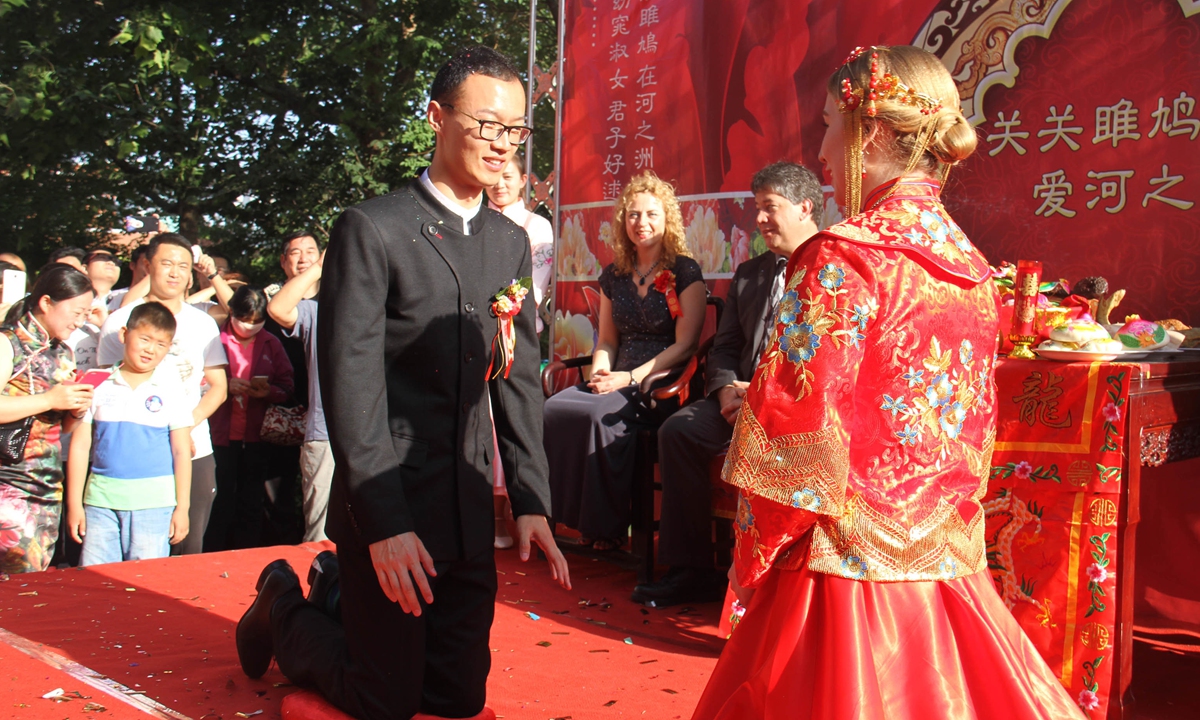Easing constraints of foreign spouses can help solve gender imbalance, but risks, uncertainties remain
By Huang Lanlan and Li Qiao Source: Global Times Published: 2020/12/27 20:08:40

A Vietnamese wife and her husband take the train T8701 from Nanning, Southwest China's Guangxi Zhuang Autonomous Region, to Hanoi before the Spring Festival in February 2019. Photo: IC
Fang and his Vietnamese wife live in a village in East China's Jiangxi Province. He drives a taxi in another county and only returns to his village on weekends. Even after five years of marriage, she's not entitled to hold a job. She passes the lonely weekdays tending the family's farm.
Fang said he fell in love with his wife at first sight during a matchmaking event in rural Vietnam in 2015. They soon married and Fang brought his bride back to China. His wife remains in China on a "family" or Q visa which doesn't allow her to hold a job.
Many foreign spouses want to have the right to work and contribute to Chinese society and their family's future. Chinese experts have even suggested offering foreign spouses more equitable treatment that could help ease the country's gender imbalance and increase the birthrate.
"My wife wants to work, and she wants to have pension after retirement," Fang told the Global Times. "She deserves these rights."
However, experts warned that potential problems such as cultural gap and even illegal and criminal acts need to be taken into consideration if the country tries to ease the limitations for cross-border marriages.
Low level
The number of new Chinese-foreign couples, as well as mainland residents marrying residents from Hong Kong, Macao and Taiwan, remained basically steady from 2009 to 2018, fluctuating slightly between 40,000 and 50,000 each year, according to the 2019 China Civil Affairs Statistical Yearbook.
Transnational marriages accounted for 0.47 percent of all marriages in 2018 in China, much lower than the 3.7 percent in Japan that year, official statistics showed.
China's limits on the residency of foreign spouses is stricter than most other countries. Foreign spouses are only entitled to work if they meet the qualifications for a work visa, which likely will require a bachelor's degree in the field of intended employment.
Most foreign spouses in urban areas have jobs because they have met the criteria for a work visa, not because of their marital status.
Jack (pseudonym), an American who has stayed in Northeast China's Liaoning Province for five years with his Chinese wife, invested in their own business, a startup company, to qualify for his work permit.
According to Measures for the Administration of Examination and Approval of Foreigners' Permanent Residence in China, only foreigners married to a Chinese citizen for five years and residing in China for at least five consecutive years, with at least nine months of residence in China each year, are eligible to apply for a "green card." These are minimum thresholds, and applicants may face more requirements in practice.
"Each time I ask about the green card at the public security bureau, they tell me it's very difficult to get one," Mike, a Canadian who is married to a Chinese woman and has lived in Southwest China's Sichuan Province since 2006, told the Global Times. Mike holds a Q visa.
Time to encourage
Some Chinese demographers and public administration scholars say encouraging transnational marriage would help China ease its gender imbalance.
There are an estimated 30 million more men than women of marriage age in China, said Peng Xizhe, director of the Center for Population and Development Policy Studies under Fudan University. Some men, especially those in rural areas, have difficulty finding women for marriage due to fierce competition, Peng said.
"Transnational marriages can, to some extent, improve China's 'marriage squeeze'," Peng told the Global Times. "Even though we can't solely rely on foreign wives to solve this problem - having millions of foreign brides come to China is impossible - it could be a part of the solution."
Transnational marriages may also help with China's disappearing demographic dividend, said demographer Zhou Haiwang, deputy director of the Institute of Population and Development under the Shanghai Academy of Social Sciences.
"If foreign spouses are granted more rights enjoyed by citizens, more foreign nationals may be willing to settle in China, and if so, their children may be an addition to the Chinese workforce," Zhou said.
Some scholars point to the case of the foreign women who maintain de facto marriage relationship with Chinese men. In some southern border areas, there were women who sneaked into or were trafficked into China from nearby countries including Vietnam, Cambodia and Laos in the 1990s and early 2000s, said Han Jialing, a research fellow at the Institute of Sociology under the Chinese Academy of Social Sciences.
These women, who have been living in China for decades but have neither a valid passport nor a marriage certificate, face bigger difficulties than other legal foreign spouses do, Han said.

A foreign bride in Shanghai Photo: IC
'Underground foreign wives'
It's hard to accurately know how many such "underground foreign wives" are in China - they are not included in China's official population statistics.
Fieldwork then becomes the main method for researchers to know how big the group is in a certain place. A township in the border city of Ruili in Southwest China's Yunnan Province, for instance, had 1,425 transnational families in March 2017, accounting for 35 percent of all local families. These figures came from frontline investigations of a Yunnan-based scholar Chen Xue.
Han conducts similar investigations. Since 2018, she randomly visited or surveyed more than 100 villages in South China's Guangdong Province each year with Yu Jiaqing, a research assistant at the Institute for Economic and Social Research under Jinan University, to learn about the life of foreign wives there.
More than 20 of the 100 villages they reached in 2019 had foreign wives, ranging from a few to nearly 100 in number. These foreign women were in their 40s or 50s. They have learned to speak Putonghua or Guangdong dialects, and have gotten used to local customs and lifestyle through the years, Han and Yu recalled.
"Nonetheless, very few of them were legal spouses registered at China's civil affairs organs," Yu told the Global Times.
Yu mentioned a Vietnamese woman they encountered in a Guangdong village. The woman, nicknamed Xin, comes from a rural region close to Hanoi. Xin was sold to a Chinese man by her relatives for some 3,000 yuan ($458.1) in 1993. She settled in China and gave birth to three sons, sneaking back home to see her mother every two or three years.
Without a legal identity, Xin, as well as many other "underground foreign wives" in Guangdong, had to either do farm work in the village or look for a low-paid job at small, illegal workshops.
Xin eventually obtained her marriage certificate last year after months of efforts. She applied for a new passport at the Vietnamese consulate general in Guangzhou, capital city of Guangdong, and a temporary residence permit at the local public security bureau, and then flew back to Vietnam to get a new visa. The long, cumbersome process cost this unwealthy woman 8,000 yuan. "I've been in China for nearly 30 years; I never felt secure until I got it [marriage certificate]," Xin told Yu earlier.
Han and Yu have called on the authorities to offer citizen-like treatment to foreign spouses, including the "underground" ones in a de facto marriage relationship with Chinese. "They are families of us Chinese people," the scholars told the Global Times.

A Chinese man and an American woman hold their wedding ceremony in Binzhou, East China's Shandong Province. Photo: IC
Risks and uncertainties
Transnational marriages, while expected to help solve China's existing population problems a bit, may also bring the country possible risks and uncertainties, some scholars worry.
The language and cultural gaps between China and the home countries of foreign spouses may create divergences in raising children and caring for the elderly, which is likely to cause family and social instability, Lu Jiehua, a professor of sociology at Peking University, told the Global Times.
Also, it's important to avoid transnational marriages where the motive is not pure, such as obtaining China's permanent residency or marrying for economic reasons, Lu said.
Police in North China's Hebei Province announced earlier this month to have rooted out a transnational marriage fraud ring consisting of seven Chinese men and two Myanmar women. The fraud ring had committed seven acts of fraud before being arrested, involving more than 1 million yuan, reported China News Service on December 21.
Worse still, the practice of transnational marriage may lead to human trafficking, which has been strictly cracked down by Chinese police in recent years. "Unlike the 1980s and 90s, today the trafficking situation in Chinese border areas has largely improved," Han said.
Authorities, therefore, need to take all the potential problems into consideration, and formulate and implement relevant regulations based on these concerns before officially encouraging transnational marriages, Zhou said. "This is not something to be achieved overnight."
Zhang Yutong contributed to this story